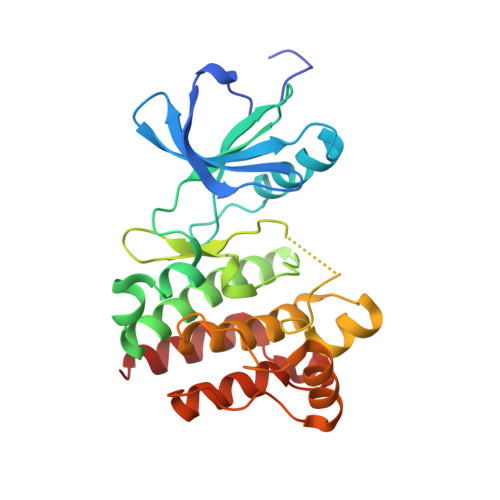Structure-guided design of aminopyrimidine amides as potent, selective inhibitors of lymphocyte specific kinase: synthesis, structure-activity relationships, and inhibition of in vivo T cell activation.
DiMauro, E.F., Newcomb, J., Nunes, J.J., Bemis, J.E., Boucher, C., Chai, L., Chaffee, S.C., Deak, H.L., Epstein, L.F., Faust, T., Gallant, P., Gore, A., Gu, Y., Henkle, B., Hsieh, F., Huang, X., Kim, J.L., Lee, J.H., Martin, M.W., McGowan, D.C., Metz, D., Mohn, D., Morgenstern, K.A., Oliveira-dos-Santos, A., Patel, V.F., Powers, D., Rose, P.E., Schneider, S., Tomlinson, S.A., Tudor, Y.Y., Turci, S.M., Welcher, A.A., Zhao, H., Zhu, L., Zhu, X.(2008) J Med Chem 51: 1681-1694
- PubMed: 18321037
- DOI: https://doi.org/10.1021/jm7010996
- Primary Citation of Related Structures:
3BYS, 3BYU - PubMed Abstract:
The lymphocyte-specific kinase (Lck), a member of the Src family of cytoplasmic tyrosine kinases, is expressed in T cells and natural killer (NK) cells. Genetic evidence, including knockout mice and human mutations, demonstrates that Lck kinase activity is critical for normal T cell development, activation, and signaling. Selective inhibition of Lck is expected to offer a new therapy for the treatment of T-cell-mediated autoimmune and inflammatory disease. With the aid of X-ray structure-based analysis, aminopyrimidine amides 2 and 3 were designed from aminoquinazolines 1, which had previously been demonstrated to exhibit potent inhibition of Lck and T cell proliferation. In this report, we describe the synthesis and structure-activity relationships of a series of novel aminopyrimidine amides 3 possessing improved cellular potency and selectivity profiles relative to their aminoquinazoline predecessors 1. Orally bioavailable compound 13b inhibited the anti-CD3-induced production of interleukin-2 (IL-2) in mice in a dose-dependent manner (ED 50 = 9.4 mg/kg).
- Department of Medicinal Chemistry, Amgen Inc., One Kendall Square, Cambridge, MA 02139, USA. edimauro@amgen.com
Organizational Affiliation:

















